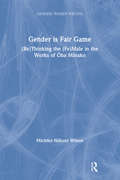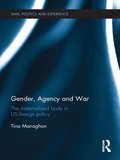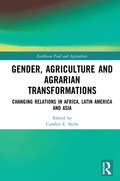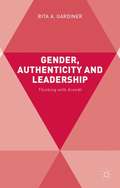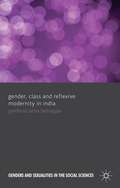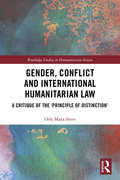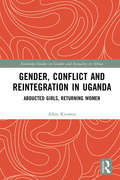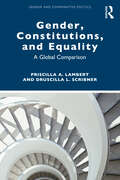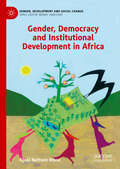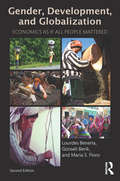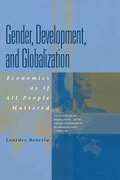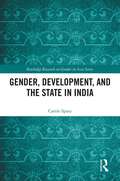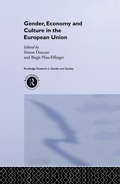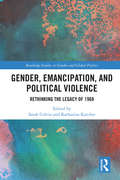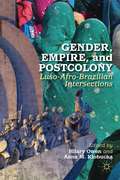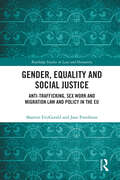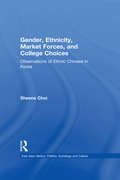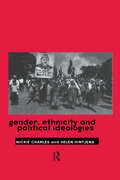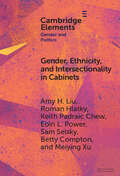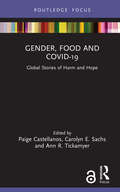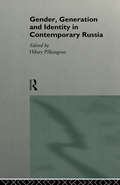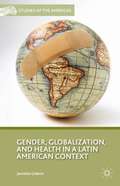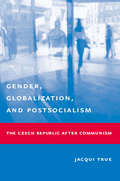- Table View
- List View
Gender is Fair Game: (Re)Thinking the (Fe)Male in the Works of Oba Minako
by Michiko N. WilsonThis is a critical study of the major novels and short stories of Minako Oba (1930-) the undisputed leader in the resurgence of women writers in Japan. Oba is a postmodernist, rethinking gender and culture, encompassing the theme of female Bildungsroman, and drawing on marinated memories.
Gender, Agency and War: The Maternalized Body in US Foreign Policy (War, Politics and Experience)
by Tina ManaghanThis book traces practices of militarization and resistance that have emerged under the sign of motherhood in US Foreign Policy. Gender, Agency and War examines this discourse against the background of three key moments of American foreign policy formation: the anti-nuclear movement of the 1980s, the Gulf War of the early 1990s, and the recent invasion of Iraq. For each of these moments the author explores the emergence of a historically specific and emblematic maternalized mode of female embodiment (ranging from the ‘hysterical’ antinuclear protester to the figure of ‘Supermom’), in order to shed light onto the various practices which define and enable expressions of American sovereignty. In so doing, the text argues that the emergence of particular raced, gendered, and maternalized bodies ought not to be read as merely tangential to affairs of state, but as instantiations of global politics. This work urges an approach that rereads the body as an ‘event’ – with significant implications for the ways in which international politics and gender are currently understood. This book will be of much interest to students of gender politics, critical security studies, US foreign policy and IR in general.
Gender, Agriculture and Agrarian Transformations: Changing Relations in Africa, Latin America and Asia (Earthscan Food and Agriculture)
by Carolyn E. SachsThis book presents research from across the globe on how gender relationships in agriculture are changing. In many regions of the world, agricultural transformations are occurring through increased commodification, new value-chains, technological innovations introduced by CGIAR and other development interventions, declining viability of small-holder agriculture livelihoods, male out-migration from rural areas, and climate change. This book addresses how these changes involve fluctuations in gendered labour and decision making on farms and in agriculture and, in many places, have resulted in the feminization of agriculture at a time of unprecedented climate change. Chapters uncover both how women successfully innovate and how they remain disadvantaged when compared to men in terms of access to land, labor, capital and markets that would enable them to succeed in agriculture. Building on case studies from Africa, Latin America and Asia, the book interrogates how new agricultural innovations from agricultural research, new technologies and value chains reshape gender relations. Using new methodological approaches and intersectional analyses, this book will be of great interest to students and scholars of agriculture, gender, sustainable development and environmental studies more generally.
Gender, Authenticity and Leadership: Thinking with Arendt
by Rita A. GardinerThis book examines the conceptual underpinnings of authentic leadership to discover why so little attention has been paid to gender. The author explores the failure to interrogate the complexities surrounding the concept of authenticity, especially as it relates to the diversity of lived experience.
Gender, Class and Reflexive Modernity in India (Genders and Sexualities in the Social Sciences)
by Jyothsna Latha BelliappaUsing in-depth interviews, this book explores women employed in the Indian IT industry and highlights the gender specific and culturally specific consequences of reflexive modernity in neo-liberal India.
Gender, Class, and Freedom in Modern Political Theory
by Nancy J. HirschmannIn Gender, Class, and Freedom in Modern Political Theory, Nancy Hirschmann demonstrates not merely that modern theories of freedom are susceptible to gender and class analysis but that they must be analyzed in terms of gender and class in order to be understood at all. Through rigorous close readings of major and minor works of Hobbes, Locke, Rousseau, Kant, and Mill, Hirschmann establishes and examines the gender and class foundations of the modern understanding of freedom. Building on a social constructivist model of freedom that she developed in her award-winning book The Subject of Liberty: Toward a Feminist Theory of Freedom, she makes in her new book another original and important contribution to political and feminist theory. Despite the prominence of "state of nature" ideas in modern political theory, Hirschmann argues, theories of freedom actually advance a social constructivist understanding of humanity. By rereading "human nature" in light of this insight, Hirschmann uncovers theories of freedom that are both more historically accurate and more relevant to contemporary politics. Pigeonholing canonical theorists as proponents of either "positive" or "negative" liberty is historically inaccurate, she demonstrates, because theorists deploy both conceptions of freedom simultaneously throughout their work.
Gender, Conflict and International Humanitarian Law: A critique of the 'principle of distinction' (Routledge Studies in Humanitarian Action)
by Orly Maya SternThis book conducts a gendered critique of the ‘principle of distinction’ in international humanitarian law (IHL), with a focus on recent conflicts in Africa. The ‘principle of distinction’ is core to IHL, and regulates who can and cannot be targeted in armed conflict. It states that civilians may not be targeted in attack, while combatants and those civilians directly participating in hostilities can be. The law defines what it means to be a combatant and a civilian, and sets out what behaviour constitutes direct participation. Close examination of the origins of the principle reveals that IHL was based on a gendered view of conflict, which envisages men as fighters and women as victims of war. Problematically, this view often does not accord with the reality in ‘new wars’ today in which women are playing increasingly active roles, often forming the backbone of fighting groups, and performing functions on which armed groups are highly reliant. Using women’s participation in ‘new wars’ in Africa as a study, this volume critically examines the principle through a gendered lens, questioning the extent to which the principle serves to protect women in modern conflicts and how it fails them. By doing so, it questions whether the principle of distinction is suitable to effectively regulate the conduct of hostilities in new wars. This book will be of much interest to students of international law, gender studies, African politics, war and conflict studies, and international relations.
Gender, Conflict and Reintegration in Uganda: Abducted Girls, Returning Women (Routledge Studies on Gender and Sexuality in Africa)
by Allen KiconcoThis book explores what happened when the tens of thousands of girls (now women) abducted by Lord’s Resistance Army and inducted into their campaign of violence against the Ugandan government, returned home. Drawing on extensive original research, the author considers the challenges which the formerly abducted women have encountered upon their return, the strategies which have been used to aid their reintegration, and the enduring stigma of abduction which they continue to suffer from. The author demonstrates that ‘home’, a place of hope and comfort, can also be a hostile environment which leaves formerly abducted women in precarious and vulnerable situations. The many shortcomings in the reintegration process have serious implications for the prospects of post-conflict reconstruction. Analysing reintegration as a long-term and dynamic process which involves complex negotiations and exchanges between hosting communities and formerly abducted women, this book will be of interest to scholars, policymakers and practitioners working in the fields of post-conflict reconstruction, African politics and gender and conflict.
Gender, Constitutions, and Equality: A Global Comparison (Gender and Comparative Politics)
by Priscilla A. Lambert Druscilla L. ScribnerThis book addresses whether the "gendering" of constitutions promotes women’s equality. The authors use a mixed-methods approach to explore how constitutional gender rights affect political processes and strategies, legislative and judicial outcomes, and ultimately women’s equality. They employ a cross-national study by constructing a unique database of gender provisions in over 100 countries at three points in time: 1995, 2005, and 2015. Four in-depth comparative case studies on Argentina, Chile, South Africa, and Botswana trace the complex relationship between constitutional law, strategies, and policy change in four policy areas: family law, gender-based violence, reproductive rights, and employment rights. They argue that where egalitarian constitutional provisions are present, women’s rights advocates can use them as a tool to fight gender discrimination and pursue policy changes that address gender-based power disparities. At a time when gender equality provisions are increasingly common in constitutional design, this book clarifies the mechanisms that link constitutional provisions to changes in process and outcomes while also systematically describing and analyzing the effect of gender provisions across countries and over time. Gender, Constitutions, and Equality will inform theoretical debates on gender and politics, law and social change, feminist institutionalism, and constitutional design and its effect on legislation and political strategies.
Gender, Democracy and Institutional Development in Africa (Gender, Development and Social Change)
by Njoki Nathani WaneThis book analyses African foundations of gender, education, politics, democracy and institutional development by stimulating theoretical discourses. It offers a discursive framework on ways to examine the conceptualizations of African social development and a critical discourse on debunking the misconceptions that are attached to African location in the global arena. The volume challenges the danger of minimizing and oversimplifying the role of Africa in the international space. This will be ideal for researchers, students and scholars in the areas of African and gender studies, development, politics and education.
Gender, Development and Globalization: Economics as if All People Mattered
by Lourdes Beneria Günseli Berik Maria FloroGender, Development, and Globalization is the leading primer on global feminist economics and development. Lourdes Benería, a pioneer in the field of feminist economics, is joined in this second edition by Gunseli Berik and Maria Floro to update the text to reflect the major theoretical, empirical, and methodological contributions and global developments in the last decade. Its interdisciplinary investigation remains accessible to a broad audience interested in an analytical treatment of the impact of globalization processes on development and wellbeing in general and on social and gender equality in particular. The revision will continue to provide a wide-ranging discussion of the strategies and policies that hold the most promise in promoting equitable and sustainable development. The authors make the case for feminist economics as a useful framework to address major contemporary global challenges, such as inequalities between the global South and North as well as within single countries; persistent poverty; and increasing vulnerability to financial crises, food crises, and climate change. The authors' approach is grounded in the intellectual current of feminism and human development, drawing on Amartya Sen's capability approach and focused on the importance of the care economy, increasing pressures faced by women, and the failures of neoliberal reforms to bring about sustainable development, reduction in poverty, inequality, and vulnerability to economic crisis.
Gender, Development and Globalization: Economics as if All People Mattered
by Lourdes BeneriaWith Cold War politics lost as the organizing principle behind international politics, development has become the most import policy goal of every international organization. There is an underside (and a human side) to development, and feminism has made inroads into the highly technical debates and frothy prophecies by examining what the future really holds for the people who will live it. <P><P>This book highlights the ways in which feminist analysis has contributed to a richer understanding of international development and globalization. By combining theoretical, empirical, and political perspectives and discussing cutting-edge debates around development, globalization, economic restructuring, and feminist economics, Gender, Development and Globalization presents the ultimate primer on global feminist economics.
Gender, Development, and the State in India (Routledge Research on Gender in Asia Series)
by Carole SparyThis book explores the relationship between the state, development policy, and gender (in)equality in India. It discusses the formation of state policy on gender and development in India in the post-1990 period through three key organising concepts of institutions, discourse, and agency. The book pays particular attention to whether the international policy language of gender mainstreaming has been adopted by the Indian state, and if so, to what extent and with what results. The author examines how these issues play out at multiple levels of governance – at both the national and the subnational (state) level in federal India. This comparative aspect is particularly important in the context of increasing autonomy in development policymaking in India in the 1990s, divergent development policy approaches and outcomes among states, and the emerging importance of subnational state development policies and programmes for women in this period. The author argues that the state is not a monolith but a heterogeneous, internally differentiated collection of institutions, which offers complex and varying opportunities and consequences for feminists engaging the state. Demonstrating that the Indian empirical case is illuminating for studies of the gendered politics of development, and international debates on gender mainstreaming, the book highlights the politics of negotiating gender equality strategies in the contemporary context of neo-liberal development and brings together complex issues of modernity, postcolonialism, identity politics, federalism, and equality within the broader context of the world’s largest democracy. This book will be of interest to scholars interested in the politics of gender equality, state feminism, and gender mainstreaming; federalism and multi-level governance; and development studies and gender in South Asia.
Gender, Economy and Culture in the European Union (Routledge Research in Gender and Society #Vol. 5)
by Birgit Pfau-Effinger Simon DuncanProviding a comprehensive analysis of comparative gender difference in the EU, this book addresses a spectrum of gender issues. From employment and households, to culture, sexuality and male violence, the book transcends any 'economy/culture' divide. This wide coverage is placed within a conceptual view of structured 'gender cultures' which vary spatially and historically. Individual chapters are written around this common theme by an expert board of international contributors, drawn from a variety of intellectual and disciplinary backgrounds, allowing the reader to compare between chapters and read across them.
Gender, Emancipation, and Political Violence: Rethinking the Legacy of 1968 (Routledge Studies in Gender and Global Politics)
by Sarah Colvin Katharina KarcherThis volume presents and interrogates both theoretical and artistic expressions of the revolutionary, militant spirit associated with "1968" and the aftermath, in the specific context of gender. The contributors explore political-philosophical discussions of the legitimacy of violence, the gender of aggression and peaceability, and the contradictions of counter violence; but also women’s artistic and creative interventions, which have rarely been considered. Together the chapters provide and provoke a wide-ranging rethink of how we read not only "1968" but more generally the relationship between gender, political violence, art and emancipation. This work will be of great interest to students and scholars of protest and violence in the fields of history, politics and international relations, sociology, cultural studies, and women’s studies.
Gender, Empire, and Postcolony: Luso-Afro-Brazilian Intersections
by Hilary Owen Anna M. KlobuckaAnalyzing a wide body of cultural texts, including literature, film, and other visual arts, Gender, Empire, and Postcolony: Luso-Afro-Brazilian Intersections is a diverse collection of essays on gender in Portuguese colonialism and Lusophone postcolonialism.
Gender, Equality and Social Justice: Anti Trafficking, Sex Work and Migration Law and Policy in the EU (Routledge Studies in Law and Humanity)
by Jane Freedman Sharron FitzGeraldThis book addresses a gap in both contemporary theorising and empirical analysis of the European Union’s (EU) law and policy frameworks on migration, sex work and anti trafficking. Drawing on the authors’ previous research on these policies and with their practical experience of engaging with various EU institutions in law and policy-making fora around gender, equality and justice, the work examines the processes involved in constructing and enacting policy frameworks and legal interventions on these issues, within a feminist analytical framework. The authors map how EU agenda-setting operates, and detail the roles that various EU institutions, external groups and actors, including non-governmental organisations, play in promoting or blocking policy on these three issues. The book draws on feminist theorising on gender, policy-making and social justice to develop a general theoretical framework to help us understand how and why a consensus has seemingly been achieved at EU level on what constitutes gender equality in these three policy areas. The book presents a valuable resource for academics, researchers and policy makers in Law, Migration, EU policy making and Gender Studies.
Gender, Ethnicity and Market Forces: Observations of Ethnic Chinese in Korea (East Asia: History, Politics, Sociology and Culture)
by Sheena ChoiFirst published in 2001. Routledge is an imprint of Taylor & Francis, an informa company.
Gender, Ethnicity and Political Ideologies
by Nickie Charles Helen HintjensFirst Published in 2004. Routledge is an imprint of Taylor & Francis, an informa company.
Gender, Ethnicity, and Intersectionality in Cabinets: Asia and Europe in Comparative Perspective (Elements in Gender and Politics)
by Amy H. Liu Roman Hlatky Keith Padraic Chew Eoin L. Power Sam Selsky Betty Compton Meiying XuWhat explains patterns of representation – of women and ethnic minorities – in government cabinets? The authors argue governments diversify their cabinets when (1) a minority group – and it need not be ethnic – is sizable and can mobilize (political competition); and/or (2) the general population believes in and expects the inclusion of minorities (popular norms). The authors test their argument using original cabinet data from Asia and Europe (N=93) 1960-2015 and a most-similar design of four case studies. They identify the gender and ethnicity of 91,000 country-year-minister observations – with consideration of the rank of their ministerial portfolio. They find evidence that in countries where there is political competition and/or popular norms, cabinets have fewer double-hegemons. However, this does not necessarily suggest minorities are holding portfolios of substantive prestige. This project offers a way to study intersectionality in democratic representation and political institutions.
Gender, Food and COVID-19: Global Stories of Harm and Hope (Routledge Focus on Environment and Sustainability)
by Paige Castellanos, Carolyn E. Sachs and Ann R. TickamyerThis book documents how COVID-19 impacts gender, agriculture, and food systems across the globe with on-the-ground accounts and personal reflections from scholars, practitioners, and community members. During the coronavirus pandemic with many people under lockdown, continual agricultural production and access to food remain essential. Women provide much of the formal and informal work in agriculture and food production, distribution, and preparation often under precarious conditions. A cadre of scholars and practitioners from across the globe provide their timely observations on these issues as well as more personal reflections on its impact on their lives and work. Four major themes emerge from these accounts and are interwoven throughout: the pervasiveness of food insecurity, the ubiquity of women’s care work, food justice, and policies and research that can that can result in a resilience that reimagines the future for greater gender and intersectional equality. We identify what lessons we can learn from this global pandemic about research and practices related to gender, food, and agricultural systems to strive for more equitable arrangements. This book will be of great interest to students, scholars and practitioners working on gender and food and agriculture during this global pandemic and beyond.
Gender, Generation and Identity in Contemporary Russia
by Hilary PilkingtonThis book explores the lives and expectations of young women in the new Russia, looking at the enormous changes that the new social and economic environment have brought. The authors draw on the growing literature on gender and generation in the West which has arisen as a result of the recognition that the experience of youth is classed, raced and gendered and that the experience of gender is mediated by class, race, ethnicity, sexuality and age. They consider the role of the media, state and social institutions in shaping opportunities and experiences in the post-Soviet environment, focusing on the strategies employed by individual women to reforge social identities in a society in which they have been dislocated more acutely than in any other `postmodern' society.
Gender, Globalization, And Health In A Latin American Context
by Jasmine GideonUsing a political economy of health, this book examines the linkages between gender, globalization, and health in a Latin American context.
Gender, Globalization, and Postsocialism: The Czech Republic After Communism
by Jacqui TrueTrue examines political and gendered identities in flux in post-communist Czech Republic. She argues that the privatization of a formerly state economy and the adoption of consumer-oriented market practices were shaped by ideas and attitudes about gender roles. This book also offers a provocative general thesis about the inextricable linkages between political and economic changes and gender identities.
Gender, Globalization, and Postsocialism: The Czech Republic After Communism
by Jacqui TrueHow are changing gender relations shaping and being shaped by post-socialist marketization and liberalization? Do new forms of economic and cultural globalization open spaces for women's empowerment and feminist politics? The rapid social transformations experienced by the people of the Czech Republic in the wake of the collapse of communism in 1989 afford political scientist Jacqui True with an opportunity to answer these questions by examining political and gendered identities in flux. She argues that the privatization of a formerly state economy and the adoption of consumer-oriented market practices were shaped by ideas and attitudes about gender roles.Though finely tuned to the particular, local traditions that have defined the boundaries of globalization for Czech men and women, Gender, Globalization, and Postsocialism also offers a provocative general thesis about the inextricable linkages between political and economic changes and gender identities.
